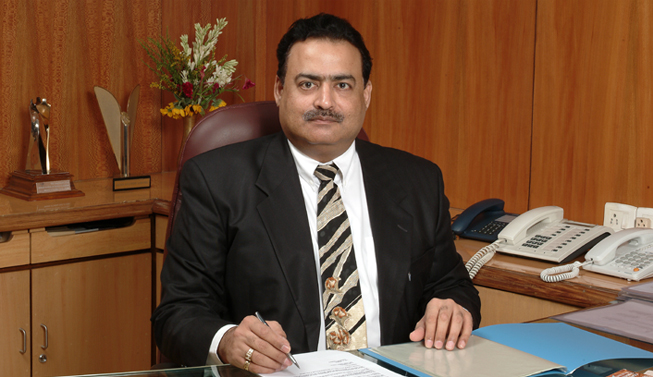Asian Leather was founded by Shri Nari Kalwani in 1992 and since then it has evolved into a company producing international quality leather handbags, wallets, purses and other small leather goods for international brands of Europe, UK and Latin America. As a “Government of India recognized Star Export House”, Asian Leather is a professionally-managed and customer-focused fully compliant organization. Asian Leather has also been a winner of several national and international awards throughout its history for its excellence in export performance. In this interview* Shri. Nari Kalwani , Chairman and Managing Director, Asian Leather, shares the story of how the company is marching ahead, keeping pace with technology and trends in the global leather industry.

Meeting global standards to create more jobs as an export house
Global brands prefer to work with ethical and dedicated factories with a long record of compliances. If Indian exporters are ready to meet their criteria, getting large quantity of regular export orders is not a problem and to execute the orders, trained manpower will be required and in this way more jobs can be created in India. Our factory is compliant with international human rights, labour , social & ethical norms and posses all the certifications from the international accredited agencies. The company has often led the way in introducing compliance and manufacturing best practices within the Indian leather goods industry and our long association with some of the most selective customers is a testimony to our commitment.
Technology adoption and skill upgradation
Changing technologies in leather industry has immensely impacted in the area of pattern making, embellishment fitting, pattern cutting, auto cutting, reverse cutting resulting substantial increase in productivity and subsequent demand for new skills and knowledge.
Appropriate skill development and training ensures better quality, greater productivity and timely delivery of shipment which is first and foremost condition of any importer. Hence, quality and quantity output from a skilled and trained employee is the basic prerequisite to run the production successfully.
Apart from in-house training, our employees are also deputed to various training programmes conducted by technical institutions on need base, where they are imparted training for re-skilling and up-skilling to work in different areas of operation in the shop floor.
Hiring and retaining skilled workforce
As per our HR philosophy, right worker has to be matched with the right job. On the basis of appraisal, the good performers are promoted to the next higher levels in respective areas of operation giving suitable regular annual increment to retain the talent. We normally hire skilled workforce for shop floor by advertising in leading newspapers.
Sometimes we also recruit from industry related institutions. Previously we had tried to recruit some candidates through the ITIs and engage them as apprentices but due to curricular issues the experience was not encouraging. Moreover, very few of them could continue in this industry since they wanted to pursue short term gains from other fields.
Government schemes on skill development, RPL and apprenticeships
The industry needs to be explained about the schemes by percolating more information in all the regions and clusters. Once the industry is convinced, every sensible entrepreneur will take advantage of the schemes on skilling, RPL and NAPS. I am sure RPL4 will help many existing employees to get recognized for their knowledge and skills through an industry-validated certificate.
Advice to young entrepreneurs
Leather goods business can be started with a very low investment, but you have to understand the product very well, in terms of quality, delivery and pricing. When you do your best and keep the customers happy, you will continue to get many opportunities. You can also avail various support schemes of Government if your business has completed 3 years. Through this, you can purchase new machinery within the limit of Rs. 5 crores, provided you obtain necessary certificates, approvals and follow the process prescribed by the government. Remember, more machines will help in creating more jobs!
It is better to concentrate on one core idea; it’s not wise to do too many things. It is important to love the trace and identify the area you like the most, e.g leather products. Then, understand the trade and industry by experiencing the factory and undergoing training. If you want to focus on export, then understand the international market, travel to those countries.
Industry has a bright future provided you put your heart and soul and money and do the right job, do the right thing at the right time.
Here are some important points that you must keep in mind:
- Total commitment to trade and industry
- Perseverance even in adverse conditions
- Develop exposure to produce quality goods by investing time and resource on worker welfare
- Ethical management and taking the entire team along
- Dedicated team focused on satisfying customer requirements
- Simplification of processes to improve turnaround
- Open communication with the clients about their requirements
“Curriculum should be updated frequently since new job roles are coming up every year with every new machine we introduce. We need talent for these roles and of course the traditional roles will continue. Hence, there should be focus on both job roles; some products will always require manual skills, particularly in the case of skills that are getting lost due to lack of hereditary learning and sustaining them by creating interest in youth.” Kunal Kalwani, Director
“Leather is a pan-India industry with different specializations and numerous offerings to worldwide customers. Skill development initiatives should have more industry engagement with different segments to facilitate learning from each other, like a bag maker should learn from a shoe maker. Right from entry level to top management, this industry has many career options in domestic and international markets and you get to explore many countries and serve many customers.” Karan Kalwani, Director
*This interview is re-published from the newsletter “Footwear and Fashion Matters” from Leather Sector Skill Council with authorised permission.












